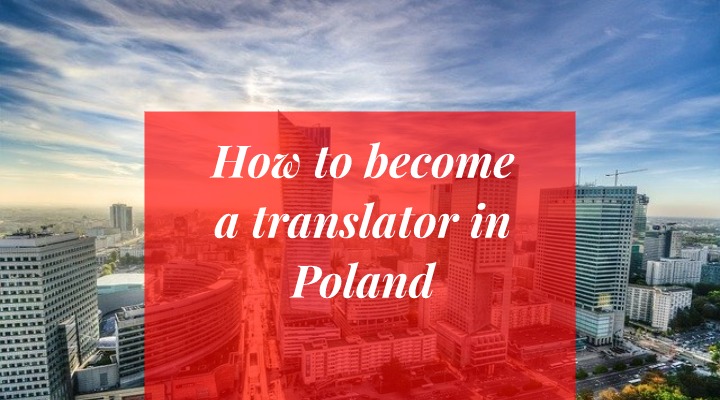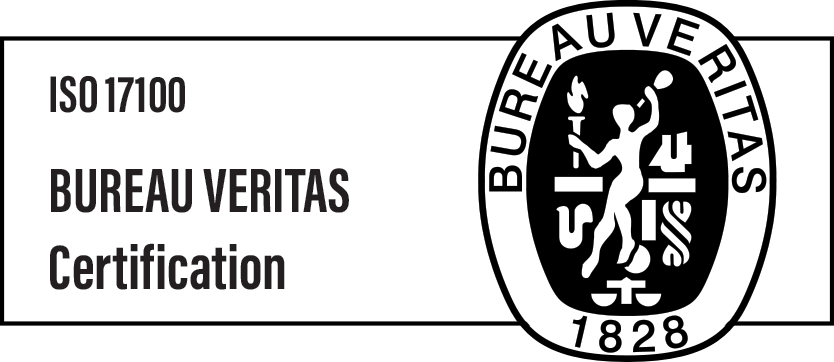How to become a translator in Poland

How to become a translator in Poland
You love learning new languages and seem to be pretty good at it. Does this mean that becoming a professional translator is the career of your dreams? Perhaps yes! However, in order to become a successful translator, you need more than just language skills. In this article, we are going to take a closer look at the profession of translator. We will also show you how you can become a translator in Poland.
First off, we have to commend you. The career of a translator can be extremely interesting and challenging. It allows you to master not only your language skills, but also your memory and concentration. You will broaden your knowledge and see the real results of your work. Moreover, one of the main perks of this profession is that you can become a freelancer and work anywhere in the world. All you need is a laptop and an internet connection. You don’t have to go to an office and spend eight hours a day there.
Of course, this doesn’t mean that there are no downsides. This job demands great organisation of work and patience, and it can be repetitive at times. But thankfully, there are tools to help you with getting the job done. We’ll talk about them in a just a moment.
What exactly does a translator do?
The first thing you have to know is that translators only work with written texts. You have to become an interpreter if you’re after oral translations, but it’s a story for a different article. Generally speaking, the translation process goes well beyond simply changing words from one language to another.
The translator must have a good understanding of the text in the source language and be able to convey (translate) its meaning and the author’s intent into the target language so that it’s both correct and clear from the linguistic point of view. Therefore, translators must have excellent linguistic skills.
How to become a professional translator in Poland
If you want to become a professional translator in Poland, you’ll need to fulfil several requirements. For starters, the most important requirement is to be fluent in at least two languages (so-called source and target language). Moreover, to be able to work as a professional translator, you should:
- Become proficient in another language
- Complete specialised training (courses or postgraduate studies)
- Obtain a certificate confirming that you have appropriate linguistic skills
- Gain work experience
It is important to know, however, that you don’t need any professional certification to become a translator in Poland. The only exception is sworn translation.
HOW TO BECOME A SWORN TRANSLATOR IN POLAND
By Polish law, a sworn translator is an official. Therefore, obtaining qualifications is regulated in detail in the Act of November 25, 2004, on the profession of a sworn translator – Ustawa z dnia 25 listopada 2004 r. o zawodzie tłumacza przysięgłego (Art. 2 point 1.).
The prerequisites are as follows:
- Polish citizenship or the citizenship of the EU or EFTA countries
- Knowledge of the Polish language
- Full legal capacity
- No criminal record for intentional or fiscal crimes
- A master’s degree in philology or postgraduate studies in translation in a selected language (in the case of having a master’s degree in another field of knowledge)
Once you meet all these conditions, you have to pass the public exam in order to become a sworn translator who can operate legally in Poland.
Development opportunities for translators in Poland
It is obvious that the translator’s primary task is to translate texts or documents from one language to another. Translators work in a variety of industries, including education, medicine, business and administration. Virtually any industry and company may need translation services, especially when they’re thinking about expanding their business abroad. On Aploq’s blog, we frequently talk about translation services for various industries. Take a look at some examples:
- IT translation services
- Technical translation services
- Medical translation services
- Marketing translation services
Each of these services has its own requirements and specificity. If you are interested in some particular type of translation service, we encourage you to read more about it before making any decisions. In every case, it’s important to become familiar with specific terminology and language styles.
The translator profession offers great flexibility in terms of choosing a career path. As a translator, you can become a freelancer, open your own translation agency (so-called LSP – language service provider), or work for another translation agency or company.
You have to remember that self-employed translators and interpreters often have a flexible schedule so that they can shape their work time depending on the number of assignments and their own needs and capabilities. Although this option might be tempting, it requires discipline and great organisation of work.
ISO 17100
If you’re planning on starting your own translation agency, you should surely be vitally interested in the ISO 17100 standard. We could say it’s a must-have certification for every professional LSP. This standard not only imposes minimum quality requirements in all the core areas of an LSP’s work, but it also defines all the significant tasks and processes related to translation. ISO 17100 covers such key issues as:
- Vendor management (translators, revisers, reviewers, proofreaders)
- Quality assurance processes
- Transparency of communication
- Project preparation and verification (including tools)
- Data protection
Furthermore, ISO 17100 talks a lot about translators and their personal traits. A person who wants to provide translation services in compliance with this ISO standard should be tech-savvy, open to learning new things and even be open to not only to translation but also to many other related areas (this includes localisation, proofreading content writing etc.).
If you are interested in how we managed to get the ISO 17100 certification, read this post on our blog: Aploq is ISO 17100:2015 certified
How much does a translator earn in Poland?
Polish translators, at least according to the Wynagrodzenia.pl website, earn about PLN 5,740 (gross). Half of the translators in Poland get a salary from PLN 4 180 to PLN 7 300. The group of 25% of the best-paid translators can count on earnings that excess PLN 7,300 gross:

If you want to make more money as a translator, check these options:
- Find a well-paid area of expertise. In general, a medical translator makes more money than their colleague who isn’t specialised.
- Go for a less popular language. Not only will you get more clients, but you will also be able to offer them a higher rate. Read more about the translation budget.
- Try to obtain additional courses and certificates. Everything that shows your expertise is valuable.
Tools for translators
Lastly, we want to talk to you about various tools you can use in everyday work. Of course, there are some machine translation tools available out there (Google Translate, Microsoft Translator), but every professional translator normally avoids using them. They are still not perfect, and human translation surpasses the one made by a machine.
You have to be aware of two things, though. Firstly, many companies still decide to translate their documents in-house, frequently with online translators. Then, these companies ask translators to tweak the outcome and make it more natural and correct from the language point of view. There is even a separate service for that – it’s called postediting. As a professional translator, you have to be prepared to provide such a service. And secondly, many LSPs are very strict about using open MT solutions and simply forbid their translators to use them.
What you can use freely, on the other hand, are CAT tools. This abbreviation stands for computer-assisted tools. These tools partially automate the translation process, relying on your terminology databases and previous translation memory.
Last year, we published two comprehensive blog posts on aids in Polish translations. If you’re thinking of becoming a Polish translator, you should definitely read both of them:
And if you’re thinking about ordering Polish translation services – feel free to drop us a line. At Aploq, we specialise in the Polish language, and all our translators and interpreters are native Polish speakers. If you would like to find out more, drop us a line, and let’s talk about your project!

